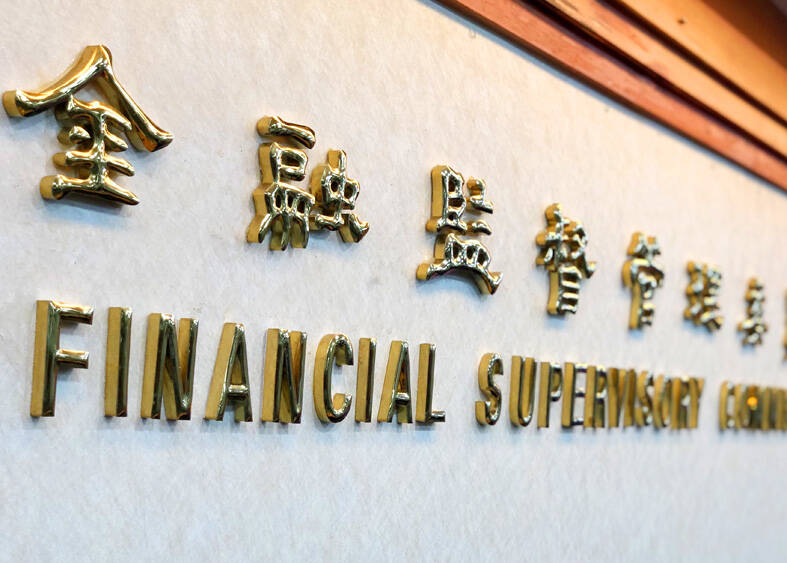The nation’s financial holding companies reported record-high unrealized losses of NT$873.2 billion (US$28.66 billion) during the second quarter, as the value of their investment assets plunged amid market routs sparked by the US Federal Reserve’s cycle of rate hikes, data from the Financial Supervisory Commission (FSC) showed on Monday.
Combined unrealized losses in the first half of this year came in at NT$827.76 billion — NT$661 billion from overseas investments and NT$166 billion from domestic investments, the data showed.
The majority of their losses came from investments in the US, which totaled NT$256.5 billion at the end of June, compared with unrealized losses of NT$38.4 billion at the end of March, the data showed.

Photo: Kelson Wang, Taipei Times
Financial holding companies’ investments in the US increased by NT$503 billion in the second quarter, mainly because local life insurance companies bought more US fixed-income products, the data showed.
China was the second biggest source of losses, with the financial holding firms reporting aggregate losses of NT$53.1 billion, followed by France with losses of NT$31.7 billion, Russia with losses of NT$31.4 billion and Mexico with losses of NT$27.5 billion, the data showed.
The companies also boosted their investments slightly in France, Russia and Mexico, but cut their investments in China by NT$88 billion during the second quarter, the data showed.
Overall, financial holding companies’ overseas exposure totaled NT$23.95 trillion at the end of June, up about 3 percent from the previous quarter, the data showed.

GROWING OWINGS: While Luxembourg and China swapped the top three spots, the US continued to be the largest exposure for Taiwan for the 41st consecutive quarter The US remained the largest debtor nation to Taiwan’s banking sector for the 41st consecutive quarter at the end of September, after local banks’ exposure to the US market rose more than 2 percent from three months earlier, the central bank said. Exposure to the US increased to US$198.896 billion, up US$4.026 billion, or 2.07 percent, from US$194.87 billion in the previous quarter, data released by the central bank showed on Friday. Of the increase, about US$1.4 billion came from banks’ investments in securitized products and interbank loans in the US, while another US$2.6 billion stemmed from trust assets, including mutual funds,

Micron Memory Taiwan Co (台灣美光), a subsidiary of US memorychip maker Micron Technology Inc, has been granted a NT$4.7 billion (US$149.5 million) subsidy under the Ministry of Economic Affairs A+ Corporate Innovation and R&D Enhancement program, the ministry said yesterday. The US memorychip maker’s program aims to back the development of high-performance and high-bandwidth memory chips with a total budget of NT$11.75 billion, the ministry said. Aside from the government funding, Micron is to inject the remaining investment of NT$7.06 billion as the company applied to participate the government’s Global Innovation Partnership Program to deepen technology cooperation, a ministry official told the

AI TALENT: No financial details were released about the deal, in which top Groq executives, including its CEO, would join Nvidia to help advance the technology Nvidia Corp has agreed to a licensing deal with artificial intelligence (AI) start-up Groq, furthering its investments in companies connected to the AI boom and gaining the right to add a new type of technology to its products. The world’s largest publicly traded company has paid for the right to use Groq’s technology and is to integrate its chip design into future products. Some of the start-up’s executives are leaving to join Nvidia to help with that effort, the companies said. Groq would continue as an independent company with a new chief executive, it said on Wednesday in a post on its Web

Taiwan Semiconductor Manufacturing Co (TSMC, 台積電), the world’s leading advanced chipmaker, officially began volume production of its 2-nanometer chips in the fourth quarter of this year, according to a recent update on the company’s Web site. The low-key announcement confirms that TSMC, the go-to chipmaker for artificial intelligence (AI) hardware providers Nvidia Corp and iPhone maker Apple Inc, met its original roadmap for the next-generation technology. Production is currently centered at Fab 22 in Kaohsiung, utilizing the company’s first-generation nanosheet transistor technology. The new architecture achieves “full-node strides in performance and power consumption,” TSMC said. The company described the 2nm process as